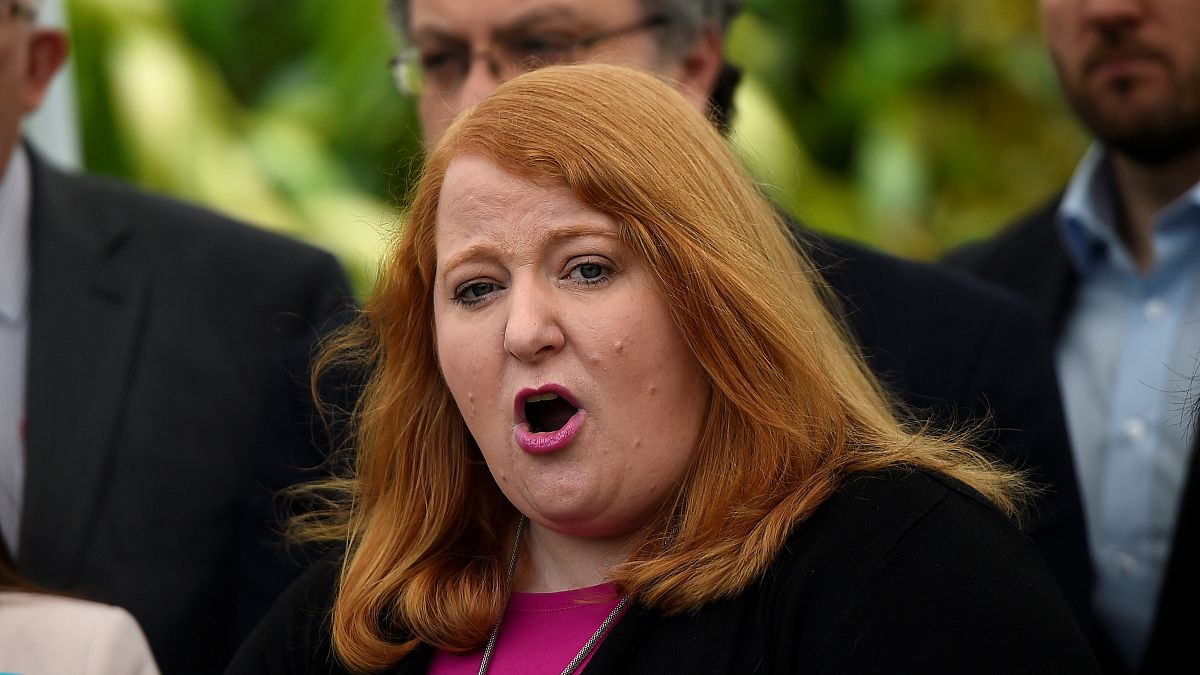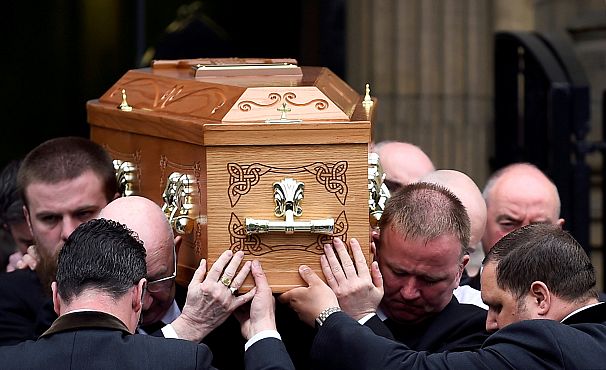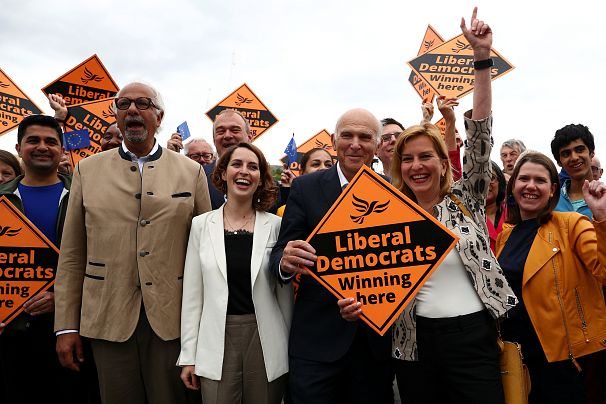Euronews answers why Northern Ireland elected two Remainer MEPs and also broke a nationalist and unionist duopoly.
In the aftermath of the European election result, and amid wrangling over positions in the next EU parliament, it seems the political fragmentation of Europe is set to continue.
The two main European groupings — the centre-right EPP and the centre-left S&D — have further shrunk, the rise of the populist Eurosceptics has coincided with a Green wave in much of Western and Northern Europe, and British voters have polarized further over Brexit.
It would be easy to overlook a historic breakthrough in Northern Ireland's politics — the election of an MEP not standing as a nationalist or a unionist.
Nearly three years after the Brexit referendum and more than two years since the collapse of the Northern Ireland government following the "Cash for Ash" scandal, Euronews examines why voters upended the longstanding Unionist-Nationalist duopoly by electing liberal Alliance Party MEP Naomi Long.
How did the Alliance party win?
Northern Ireland has been without a government since January 2017 when the late Martin McGuinness — nationalist Sinn Féin politician and former Deputy First Minister — resigned in protest at the refusal of Arlene Foster — First Minister and leader of the Unionist DUP — to step aside during a judicial inquiry into the "Cash for Ash" scandal. The fiasco originated from a renewal energy subsidy programme that began when Foster was Minister for Trade, Enterprise and Investment.
Power-sharing crumbled after Sinn Féin refused to appoint a successor to McGuinness, triggering a general election in which the DUP and Sinn Féin once again emerged as the largest parties. They failed to reach a new power-sharing deal, stumbling on issues ranging from same-sex marriage, abortion and the Irish Language Act. The deadlock has continued since.
After the New IRA admitted killing journalist Lyra McKee, the British and Irish governments on May 7 announced new talks to restore power-sharing.
Local council elections on May 2 confirmed the DUP and Sinn Féin’s status as Northern Ireland’s largest parties, with nationalist Sinn Féin retaining 105 seats, the same number as 2014, the unionist DUP achieving 122, eight fewer. It built on the consolidation from the 2017 general election in which Sinn Féin and the DUP increased their number of seats in the House of Commons to seven and 10 respectively.
However, closer analysis of the local elections shows advances made by smaller parties including Alliance, which nearly drew level with the more moderate nationalist and unionist parties, SDLP and UUP. It mirrored a wider social trend in which fewer voters in Northern Ireland identify as nationalist or unionist.
Drew Mikhael, a research fellow with the Exclusion amid Inclusion: Power-Sharing and Non-Dominant Minorities project at Queen's University Belfast, said frustration at the political deadlock has also contributed to Naomi Long's victory in the May 23 European elections.
“I think that obviously all politics is local and I think in Northern Ireland we've had a couple of years of not having an Assembly,” he said. "Alliance has been very consistent in its messaging, of having, of trying to chart a way through this constitutional barrier that we are going through."
Mikhael said the Liberal Democrat and Brexit Party surge in the Britain were driven by “a very local Brexit vs Remain argument” that appealed to voters more than the equivocal position adopted by Labour. Instead, Mikhael believes local political deadlock and “our own failures in the polity ... political environment” has “allowed Alliance to make gains on others."
What does it mean for Brexit?
The Alliance breakthrough also reflects Northern Ireland's more consistent rejection of Brexit compared to much of the rest of Britain.
In the 2016 Brexit referendum, Northern Ireland voted to remain 56% to 44% in the referendum. In this year's European elections, 57% of Northern Ireland voters elected Remainer MEPs.
"Northern Ireland reconfirmed itself as Remain rather than a massive switch," Mikhael said.
“We're still equally concerned about the constitutional future of the UK leaving and what that would mean for the Good Friday Agreement as were in 2016,” said Mikhael, “but weren't quite listened to back then.”
The so-called 'Backstop' negotiated by outgoing British PM Theresa May was an important attempt to alleviate Northern Ireland's concerns and prevent the need for a hard border between Ireland and Northern Ireland after Brexit. Mikhael believes that support for the transitional arrangements outlined in the 'Backstop' “is an important factor” in the Alliance victory coupled with their previous campaigning for Remain and consistency “on the local political scene”.
Another important factor, Mikhael said, is “their sort of agnostic approach to the constitutional question” which makes “them the more appropriate carriers of the message that the backstop is so important."
The election of two MEPs who support the 'Backstop' (Martina Anderson, for Sinn Féin, is the other) underlines its importance for Northern Ireland’s peace agreement, said Mikhael.
How does the result play out in Britain and in Europe?
Since the 2016 referendum, EU negotiators have been adamant that a solution needs to be found for the status of Northern Ireland and the border issue. This messaging has been picked up by pro-Remain candidates, who Mikhael said “were very clear ... to say that the EU has had a very very strong line on Northern Ireland and Ireland.”
The election of two pro-Remain MEPs would then would give cause to the EU to “reconfirm or double down on their attitude..." that the EU is “going to draw a hard line on the Northern Ireland issue.”
The Backstop is further complicated by Theresa May's removal as PM and and the subsequent Conservative Party leadership contest in which some candidates, such as Andrea Leadsom, advocate a no-deal while Sajid Javid has argued for modifying the Backstop. A further twist is that the Conservatives are propped up in the House of Commons by the DUP, which wants to scrap the 'Backstop' and negotiate a new deal with the EU.
Ireland’s Taoiseach (Prime Minister) Leo Varadkar was quick to point out the significance of the vote for other European actors in the Brexit process, calling it a "clear pro-European vote."
Minister for European Affairs, Helen McEntee, further reiterated Ireland’s position that the Withdrawal Agreement and Backstop deal was not for re-negotiation.
Matthew O’Toole, former British government Brexit spokesperson said that attempting to negotiate the 'Backstop' now would only serve to harden the EU’s stance.
O’Toole also pointed out that the Conservative leadership candidates attempting to negotiate with the DUP as representatives of Northern Ireland could encourage the EU to increase their insistence that the Backstop is not for negotiation after what they could argue was its endorsement in the European elections.
ALDE, the European Parliamentary group to which Alliance belongs, acknowledged the victory with Guy Verhofstadt, the parliamentary group's leader, tweeting out his congratulations.


